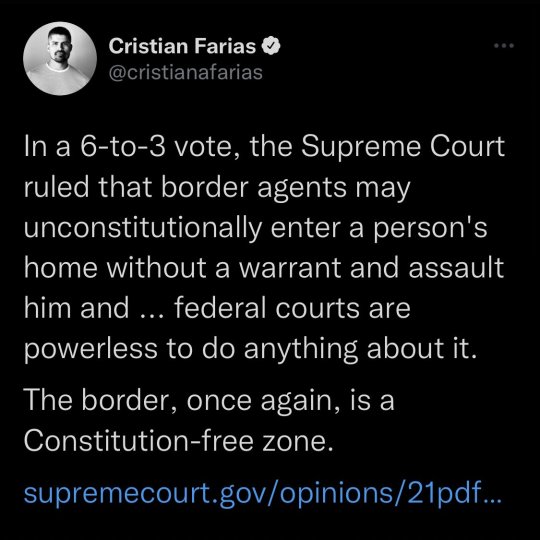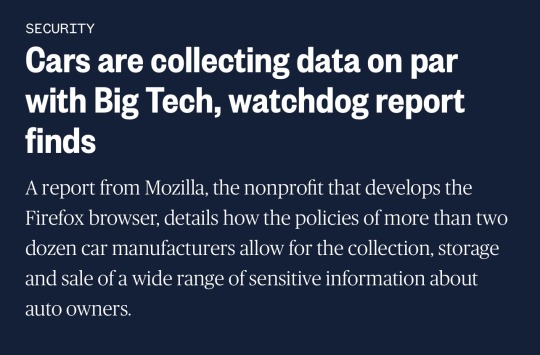#fourth amendment
Text


More specifically, 2/3rds of all people living in the US can now be forcibly and legally searched for any reason.
Authorities do not need a warrant or even suspicion of wrongdoing to justify conducting searches on any person.
You can read about it here on the latest news 06/09/2022.
#Supreme Court#fourth amendment#they want a civil war#they want to burn this country to the ground and rebuild anew
16K notes
·
View notes
Text


An internet and privacy watchdog has a warning: Your car is tracking you, and it’s collecting far more information than it needs just to get you where you’re going.
Mozilla, the nonprofit that develops the Firefox browser, released a report Wednesday detailing how the policies of more than two dozen car manufacturers allow for the collection, storage and sale of a wide range of sensitive information about auto owners.
Researchers behind the report said that cars now routinely collect data on par with tech companies, offer few details on how that data is stored and used, and don’t give drivers any meaningful way to opt out.
“Cars are a humongous privacy nightmare that nobody’s seemingly paying attention to,” said Jen Caltrider, who directs Privacy Not Included, a consumer privacy guide run by Mozilla. “And they’re getting away with it. It really needs to change because it’s only going to get worse as cars get more and more connected.”
Unlike Europe, the U.S has few meaningful regulations on how companies trade and store personal data. That’s led to a bustling industry of companies that buy and sell peope’s information, often without their knowledge.
Carmakers have a long list of personal information they say they may track, including employment and purchasing history, education, internet browsing history, location data, music and podcast listening habits, immigration status, religious and philosophical beliefs and health information.
(continue reading)
#politics#smart cars#privacy rights#data mining#spyware#capitalism#surveillance state#connected cars#4th amendment#fourth amendment#4th amendment violations
118 notes
·
View notes
Link
“Correctional facilities across the country have a variety of rationales they use to justify this, but largely it boils down to the fact that scanned electronic mail is easier to surveil than physical mail. NYC’s plan is ostensibly in response to a spike in overdoses in NYC’s jail system.”
“Council members also had privacy concerns should mail be recorded off-site by a private contractor. [...] Such data can be retained far into the future and be used against people even if they have never been charged with a crime, have been released from jail, or have had charges dismissed...”
“Previous attempts to digitize mail have resulted in first amendment lawsuits.”
#vice#civil rights#right to privacy#prison reform#us prisons#mail#fourth amendment#4th amendment#prisoners rights#prison industrial complex#human rights#first amendment#1st amendment
143 notes
·
View notes
Text
Republican state legislators In North Carolina are establishing a new investigative body that Democratic critics have aptly compared to a “secret police force.”
This new entity, formally known as the Joint Legislative Committee on Government Operations, or “Gov Ops” for short, will be chaired by Senate Leader Phil Berger (R) and House Speaker Tim Moore (R). It grants the state the authority to investigate various matters, including “possible instances of misfeasance, malfeasance, nonfeasance, mismanagement, waste, abuse, or illegal conduct.”
Gov Ops, a product of North Carolina’s most recent state budget, was established via a comprehensive bill passed in late September. Despite Democratic Gov. Roy Cooper’s refusal to sign the legislation, the Republican majority in the state legislature pushed it through just 10 days later, thanks to their veto-proof majority and the state’s laws restricting the governor’s ability to make line-item vetoes. Gov Ops is slated to take effect next week.
Any way you slice it, Gov Ops seems like a recipe for government overreach and abuse. If you find yourself under investigation by Gov Ops, you won’t be allowed to publicly discuss any alleged constitutional violations or misconduct by the investigators. All communications with committee personnel would be treated as “confidential.” Shockingly, you’d also be denied the right to seek legal counsel regarding your rights if Gov Ops were to search your property without a warrant, irrespective of whether it’s in a public or private space.
Nora Benavidez, a senior counsel with the nonprofit advocacy group Free Press, told The Daily Beast, “This is a question for the courts ultimately. But the powers granted to the Gov Ops appear to give them overreaching investigative authority, which invokes constitutionality questions.”
A critical aspect of Gov Ops development lies in the language within the statute itself. The key phrase, as highlighted by Republican state legislators, is the investigation of “possible instances of misfeasance.”
It’s unsettling that North Carolina’s Republican state legislators are poised to wield unchecked partisan authority, devoid of any form of accountability, to determine what qualifies as “possible instances of misfeasance.” This newfound investigative power threatens to have far-reaching repercussions on fundamental civil liberties, particularly those closely intertwined with the state legislature—such as voting rights and abortion.
Consider the 2020 election aftermath. Following the election’s conclusion, several North Carolina Republican lawmakers—mirroring Trump and other far-right figures nationwide—demanded access to voting machines, relying on dubious sources and unfounded claims of voter fraud.
Initially, North Carolina Republicans asserted that they would work with police to obtain warrants for such inspections. However, with the advent of Gov Ops, committee leaders could now allege “possible instances of misfeasance,” eliminating the need for a warrant and keeping the public in the dark.
With the 2024 election looming, Republicans in the state legislature will redraw voting maps after the new conservative majority on the state’s Supreme Court legalized partisan gerrymandering. (The Princeton Gerrymandering Project called North Carolina one of the most gerrymandered states in the country.)
The redistricting process in the state has been grueling; since 2011, six different versions of maps have been drawn. The process has been conducted mainly behind closed doors, and North Carolinians continue to express frustration over how they’ve been locked out of the process.
A provision of Gov Ops will likely permit lawmakers drawing the maps to bypass public records requests: “lawmakers responding to public records requests will have no obligation to share any drafts or materials that guided their redistricting decisions.”
Now, let’s look at abortion. During a legislative hearing, state Sen. Graig Meyer (D) asked lawmakers, in a hypothetical scenario, if Gov Ops could access personal health records (like ultrasounds) that are required by the state to receive abortion pills. Sen. Meyer found that Gov Ops, with its widespread ability to investigate with zero oversight, could release information like this “to the public in a hearing” if it wanted to.
youtube
Benavidez explained, “At the end of the day, Gov Ops actions and requests for information are all protected as confidential, adding a layer of opacity which means people in North Carolina will have largely no idea what the Gov Ops entity is really doing.”
The consolidation of power by Republicans in North Carolina through Gov Ops is not just a cause for concern; it is a stark warning sign. The ability of state legislators to wield unchecked authority—shielded from the scrutiny of the voters they are obliged to serve—strikes at the heart of democratic principles.
Transparency and accountability are not optional in a democracy; they are its lifeblood.
When the process of drawing voting maps becomes cloaked in secrecy, when mechanisms to hold our elected officials accountable are dismantled, we risk losing our most cherished rights to our legislators, who should be our staunchest defenders.
Government powers like Gov Ops can potentially erode the very foundations of our democracy—which can’t work if politicians refuse to work for the people and have any accountability.
#us politics#news#republicans#the daily beast#conservatives#alt right#secret police#Gov Ops#Joint Legislative Committee on Government Operations#Phil Berger#Tim Moore#Gov. Roy Cooper#government overreach#fourth amendment violations#fourth amendment#illegal search and seizure#warrants#Nora Benavidez#Free Press#Republican state legislators#civil liberties#voting rights#gun rights#abortions#confidentiality#gerrymandering#redistricting#Graig Meyer#YouTube#videos
32 notes
·
View notes
Text
isnt it silly that police don't protect you from other people. Other people protect you from police.
#fuck cops#all cops are bastards#Pigs have helicopters#cops are pigs#police brutality#Protect yourself from the police#fourth amendment
14 notes
·
View notes
Text
More details in Kansas City Star here:
Kansas newspaper raided, shut down by police had investigated chief who came from KCPD - Kansas City Star
The newspaper's 98 year old co-owner died last Saturday due to stress caused by the raid on her home on Friday.
#first amendment#journalism#free speech#fourth amendment#abuse of power#privacy protection act#kansas
18 notes
·
View notes
Link
over the ensuing decades, judges granted more and more powers to the police to stop and search vehicles. In particular, they were given the authority to do so on the mere pretext of suspecting criminal activity – in what is now known as a pretextual traffic stop. But what constitutes a “reasonable” pretext is still a legal gray area. The fourth amendment is supposed to protect us against searches and seizures that are “unreasonable”. The problem is that when fourth amendment cases are brought against police, courts and juries routinely defer to the officer’s testimony.
This judicial tilt in favor of discretionary authority inevitably led to abridgments of civil liberties, and worse.
#tyre nichols#us policing#us news#article#the guardian#traffic stop#fourth amendment#police violence#police brutality#police abolition#due process
4 notes
·
View notes
Text
Using the Threads app gives it access to all of your data, including sensitive medical information, which is a violation of HIPAA and your fourth amendment right.
1 note
·
View note
Text

#cyber privacy#cybersecurity#police state#orwellian#fog reveal#fog data science#venntel#mass surveillance#fourth amendment#big brother
6 notes
·
View notes
Text

From a friend. Particularly poignant at the moment.
We have lost a battle. We cannot surrender and lose the war. To borrow a phrase…on this we must pledge our fortunes, our honor, and our lives. The elimination of references to the sacred and the divine is intentional. They no longer have any place in this fight.
#separation of church and state#anti trump#atheist#atheism#anti religion#fuck republicans#anti christian#anti christianity#second amendment#fourth amendment#fourteenth amendment#equal rights under the law#equal protection clause
6 notes
·
View notes
Text
Say bye bye to your constitutional rights two thirds of the American population <3

2 notes
·
View notes
Text
As the national security workforce ages, dementia impacting U.S. officials poses a threat to national security, according to a first-of-its-kind study by a Pentagon-funded think tank. The report, released this spring, came as several prominent U.S. officials trusted with some of the nation’s most highly classified intelligence experienced public lapses, stoking calls for resignations and debate about Washington’s aging leadership.
Sen. Mitch McConnell, R-Ky., who had a second freezing episode last month, enjoys the most privileged access to classified information of anyone in Congress as a member of the so-called Gang of Eight congressional leadership. Ninety-year-old Sen. Dianne Feinstein, D-Calif., whose decline has seen her confused about how to vote and experiencing memory lapses — forgetting conversations and not recalling a monthslong absence — was for years a member of the Gang of Eight and remains a member of the Senate Intelligence Committee, on which she has served since 2001.
The study, published by the RAND Corporation’s National Security Research Division in April, identifies individuals with both current and former access to classified material who develop dementia as threats to national security, citing the possibility that they may unwittingly disclose government secrets.
“Individuals who hold or held a security clearance and handled classified material could become a security threat if they develop dementia and unwittingly share government secrets,” the study says.
As the study notes, there does not appear to be any other publicly available research into dementia, an umbrella term for the loss of cognitive functioning, despite the fact that Americans are living longer than ever before and that the researchers were able to identify several cases in which senior intelligence officials died of Alzheimer’s disease, a progressive brain disorder and the most common cause of dementia.
“As people live longer and retire later, challenges associated with cognitive impairment in the workplace will need to be addressed,” the report says. “Our limited research suggests this concern is an emerging security blind spot.”
Most holders of security clearances, a ballooning class of officials and other bureaucrats with access to secret government information, are subject to rigorous and invasive vetting procedures. Applying for a clearance can mean hourslong polygraph tests; character interviews with old teachers, friends, and neighbors; and ongoing automated monitoring of their bank accounts and other personal information. As one senior Pentagon official who oversees such a program told me of people who enter the intelligence bureaucracy, “You basically give up your Fourth Amendment rights.”
Yet, as the authors of the RAND report note, there does not appear to be any vetting for age-related cognitive decline. In fact, the director of national intelligence’s directive on continuous evaluation contains no mention of age or cognitive decline.
While the study doesn’t mention any U.S. officials by name, its timing comes amid a simmering debate about gerontocracy: rule by the elderly. Following McConnell’s first freezing episode, in July, Google searches for the term “gerontocracy” spiked.
“The President called to check on me,” McConnell said when asked about the first episode. “I told him I got sandbagged,” he quipped, referring to President Joe Biden’s trip-and-fall incident during a June graduation ceremony at the U.S. Air Force Academy in Colorado, which sparked conservative criticisms about the 80-year-old’s own functioning.
While likely an attempt by McConnell at deflecting from his lapse, Biden’s age has emerged as a clear concern to voters, including Democrats. 69% of Democrats say Biden is “too old to effectively serve” another term, an Associated Press-NORC poll found last month. The findings were echoed by a CNN poll released last week that found that 67% of Democrats said the party should nominate someone else, with 49% directly mentioning Biden’s age as their biggest concern.
As Commander In Chief, the President is the nation’s ultimate classification authority, with the extraordinary power to classify and declassify information broadly. No other American has as privileged access to classified information as the president.
The U.S.’s current leadership is not only the oldest in history, but also the number of older people in Congress has grown dramatically in recent years. In 1981, only 4% of Congress was over the age of 70. By 2022, that number had spiked to 23%.
In 2017, Vox reported that a pharmacist had filled Alzheimer’s prescriptions for multiple members of Congress. With little incentive for an elected official to disclose such an illness, it is difficult to know just how pervasive the problem is. Feinstein’s retinue of staffers have for years sought to conceal her decline, having established a system to prevent her from walking the halls of Congress alone and risk having an unsupervised interaction with a reporter.
Despite the public controversy, there’s little indication that any officials will resign — or choose not to seek reelection.
After years of speculation about her retirement, 83-year-old Speaker Emerita Rep. Nancy Pelosi, D-Calif., stunned observers when she announced on Friday that she would run for reelection, seeking her 19th term.
#us politics#news#republicans#Democrats#boomers#Gang of Eight#sen. Mitch Mcconnell#sen. Diane Feinstein#rep. nancy pelosi#Senate Intelligence Committee#the pentagon#classified information#RAND Corporation#National Security Research Division#national security#dementia#cognitive decline#Alzheimer’s disease#security clearances#Fourth Amendment#gerontocracy#president joe biden#us congress#2023#the intercept
17 notes
·
View notes
Text
Anlass zur Hoffnung für Verfechter von Freiheitsrechten bot jüngst eine Abstimmung des Repräsentantenhauses: Der „Fourth Amendment Is Not For Sale Act“ passierte die republikanisch dominierte Kammer des Kongresses.
Im Demokratie-Ranking des Magazins The Economist firmieren die USA seit Jahren als flawed democracy. Die Gründe für diese Degradierung zur mangelbehafteten Demokratie, die das wirtschaftsliberale Blatt anführt, mögen fragwürdig sein, an der Diagnose an sich lässt sich kaum rütteln: Ein Überwachungsstaat kann nach demokratischen Maßstäben schwerlich als makellos durchgehen. Doch am 17. April dieses Jahres passierte wider Erwarten und gegen den Widerstand der Biden-Regierung der Gesetzesentwurf zum Fourth Amendment Is Not For Sale Act das Repräsentantenhaus.
Eine schon 2021 gestartete Initiative zur Verteidigung des vierten Zusatzartikels zur Verfassung der Vereinigten Staaten hatte damit einen Etappensieg erzielt. Besagter Verfassungszusatz verbrieft den Schutz vor willkürlicher Durchsuchung, Beschlagnahme und Verhaftung – solche Maßnahmen dürfen nur aufgrund von Gerichts- oder Magistratsverfügungen erfolgen, die auf stichhaltigen Gründen basieren.
Schön wär’s. 2013 machte Edward Snowden die wohl größte und erfolgreichste Public-private-Partnership überhaupt publik, eine Maschinerie der Massenüberwachung, in der das Räderwerk von Geheimdiensten und IT-Konzernen höchst wirkungsvoll verzahnt ist. Die Akteure auf der privatwirtschaftlichen Seite waren allerdings nicht allesamt mit Enthusiasmus bei der Sache, von Yahoo – damals noch ein Konzern von einiger Bedeutung – ist sogar heftiger Widerstand gegen das Ansinnen belegt, die eigene Kundschaft systematisch zu bespitzeln.
Solche Betriebsstörungen dürften in den zurückliegenden Jahren nicht ins Gewicht gefallen sein, denn seit Snowdens Enthüllungen ist vieles besser geworden – für die Überwacher, nicht für die Bürger der Vereinigten Staaten. Längst ist man in den USA dazu übergegangen, Datenbestände en gros von Data Brokers zu kaufen, statt sie Unternehmen mit geheimen Anordnungen abzupressen. Und wieder einmal beweist der Markt seine Überlegenheit, in diesem Fall eben beim Umgehen des vierten Verfassungszusatzes.
Standortdaten, Kreditkarteninformationen, Gesundheitsdaten, Hinweise auf politische Ansichten und mehr wurden zuhauf von staatlichen Stellen erworben; Polizeibehörden, die Bundessteuerverwaltung IRS, diverse Organisationen des Militärs, das FBI, die NSA gehörten zu denen, die zugriffen. Mit dem Outsourcing der Überwachung sei man aus dem Schneider, so das Kalkül, schließlich verbiete der vierte Zusatzartikel der Verfassung nur willkürliche Ausforschung der Bürger durch den Staat, nicht die durch privatwirtschaftliche Unternehmen, die dann als Lieferanten für den Staat fungieren.
Dieser Praxis, die demokratischem Verständnis offen Hohn spricht, soll mit dem Fourth Amendment Is Not For Sale Act nun ein Riegel vorgeschoben werden. Konkret läuft das auf folgende Einschränkungen hinaus:
– Staatliche Stellen sollen nur auf Gerichtsbeschluss an Datenbestände von Datengroßhändlern (Data Brokers) gelangen, so wie es einschlägige Gesetzgebung schon fordert, wenn es um Telefongesellschaften oder Internet-Service-Anbieter geht.
– Polizeibehörden und Geheimdiensten wird der Erwerb der Daten von Personen in den USA und US-Bürgern im Ausland untersagt, wenn diese Daten aus einem Nutzer-Account oder von einem persönlichen Gerät stammen oder mittels Täuschung, Hacks, Vertragsverletzungen, Verstoß gegen Datenschutzhinweise oder Allgemeine Geschäftsbedingungen gewonnen wurden.
– Ausdrücklich ausgeschlossen als Datenlieferant für staatliche Stellen wird Clearview AI, ein Unternehmen, das Milliarden von Porträtfotos per Screen Scraping aus dem Web bezogen hat und aktuell mit zahlreichen Ermittlungsbehörden in den USA (und nicht nur dort) für Gesichtserkennung im Geschäft ist.
– Bestehende Gesetze zum Schutz der Privatsphäre sollen auf Unternehmen erweitert werden, die über Kabelnetze und Mobilfunkinfrastruktur verfügen.
– Gesetzeslücken werden geschlossen, die es Geheimdiensten erlauben, Metadaten von grenzüberschreitender Kommunikation amerikanischer Bürger zu kaufen oder anderweitig zu beschaffen. Gleiches gilt für Daten, die beim Besuch ausländischer Websites anfallen.
Diensteanbieter und andere Dritte verlieren ihre bisher durch das Justizministerium garantierte Immunität bei Beihilfe zu Überwachung, die nicht gesetzlich gefordert oder erlaubt ist.
Insgesamt ergibt sich so ein recht pralles Paket von Schutzmaßnahmen der Privatsphäre, geschnürt von Politikern der Demokratischen Partei als auch von Republikanern. Unter letzteren ist der libertäre Senator für Kentucky Rand Paul die wohl prominenteste Figur, bei den demokratischen Initiatoren ist Ron Wyden, Senator für Oregon und langjähriger Kämpfer gegen staatliche Überwachung, besonders hervorzuheben.
Seit 2021 stießen sie und andere Unterstützer des Gesetzesentwurfs auf hartnäckigen Widerstand aus Politik, von Ermittlungsbehörden und Geheimdiensten. Das Justizministerium ließ wissen, dass der Fourth Amendment Is Not For Sale Act den Ankauf von personenbezogenen Standortdaten unterbinden würde und damit die Möglichkeiten einschränke, vermisste Kinder aufzufinden, flüchtige Strafgefangene zu jagen oder gegen organisiertes Verbrechen zu ermitteln. Die National Sheriffs Association verbuchte die Vorlage kurzer Hand unter „Machtzuwachs für die Drogenkartelle“.
Und natürlich durfte in Zeiten geopolitischer Frontbildung auch der Hinweis nicht unterbleiben, dass es ein himmelschreiendes Unrecht sei, wenn dem amerikanischen Staat der Zugang zum heimischen Datenhandel unterbunden werde, für Russland und China aber weiterhin die Möglichkeit bestünde, sich gegen Bezahlung bei Data Brokers einzudecken.
Doch offensichtlich ließ sich die Mehrheit Im Repräsentantenhaus selbst von diesem Einwand nicht schrecken: Am 17. April stimmten 219 von ihnen für den Fourth Amendment Is Not For Sale Act, 199 dagegen. Damit ist allerdings nur die Voraussetzung dafür geschaffen, dass nun im Senat über den Gesetzesentwurf entschieden wird.
Es steht eine Zitterpartie bevor. In dieser Kammer des Kongresses verfügen die Demokraten über eine knappe Mehrheit, was allerdings alles andere als eine Gewähr für demokratische Umtriebe ist: So billigte der Senat am 20. April 2024 eine zweijährige Verlängerung des Abschnitts 702 des Foreign Intelligence Surveillance Act (FISA), der einen Stützpfeiler der US-Massenüberwachung darstellt.
Um es mal positiv zu formulieren: Dem ausstehenden Entscheid über den Fourth Amendment Is Not For Sale Act darf mit Spannung entgegengesehen werden.
0 notes